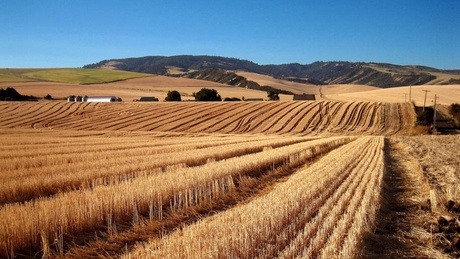forum
library
tutorial
contact

Wheat Growers Push Back
Against Farm Bill Critics
by Matthew Weaver
Capital Press, May 25, 2018
|
the film forum library tutorial contact |

|
Wheat Growers Push Back
by Matthew Weaver
|
Montana State University economics professor Vincent Smith spoke
during a May 23 Washington Policy Center conference in Spokane.
 Washington wheat representatives declined to participate in a recent Washington Policy Center conference in Spokane because a speaker claims agriculture is not experiencing a financial crisis and is calling for the termination of farm subsidy programs.
Washington wheat representatives declined to participate in a recent Washington Policy Center conference in Spokane because a speaker claims agriculture is not experiencing a financial crisis and is calling for the termination of farm subsidy programs.
The center is "an independent, nonprofit think tank that promotes sound public policy based on free-market solutions," according to its website.
Montana State University economics professor Vincent Smith spoke during the May 23 conference in Spokane.
In an October 2017 American Enterprise Institute publication, Smith and co-authors Joseph W. Glauber, Barry K. Goodwin and Daniel A. Sumner said the U.S. agriculture sector is "neither experiencing a financial crisis nor about to enter an era of extreme financial stress."
The authors say current net cash income is close to historical averages and key financial indicators are close to "the most favorable levels" observed over 60 years.
"Ideally, Congress would terminate many farm subsidy programs such as (Agriculture Risk Coverage), (Price Loss Coverage), federal crop insurance, the sugar program and marketing orders that waste scarce economic resources, raise some consumer prices and send taypayer-funded checks to relatively wealthy and very wealthy individuals," the publication states.
The authors claim the programs do not provide measurable benefits to farmers in households with incomes below the federal poverty line.
"Some of the $16 billion in federal funding currently tied up in the PLC, ARC and crop insurance subsidy program should be reallocated to programs that do provide U.S. households with genuine positive benefits, one clear example of which is agricultural research," the article states. "The rest could be reallocated to other uses, including lower tax rates."
Nicole Berg, secretary of the National Association of Wheat Growers and a Paterson, Wash., wheat farmer, was invited to the event but declined.
"We felt Dr. Smith's views were a little bit far off-base of what is actually happening with the Farm Bill right now," Berg said.
She said the center believes in a free market and free trade, but isn't necessarily working with the right definition for Washington agriculture.
"They're talking about no government involvement at all in agriculture, but yet, how are you going to do that?" she said. "If you're going to say, ‘Take away subsidies, take away crop insurance, take away the conservation titles,' farmers will go broke unless you have an escape hatch, and I haven't heard them come forth with a solution."
The Washington Association of Wheat Growers issued a press release pushing back against the event and Smith's criticisms.
"Contrary to the belief of certain individuals and groups in favor of dismantling federal farm programs, the U.S. agricultural sector is experiencing a financial crisis," stated Marci Green, WAWG president and a Fairfield, Wash., farmer. "Wheat growers are proven to be highly leveraged, and the simple fact that the wheat price recently triggered Market Assistance Loans and Loan Deficiency Payments is an indicator of the bad economic conditions in rural America."
The center's discussion is too far removed from conversations lawmakers are having in Washington D.C., Berg said.
"Would it be great to not pay taxes, sure; would it be great to not have the government involved in your business and not be pricetakers, sure, but how are you going to get there?" she said. "We have to be at the forefront of telling our story ... and telling what's happening in the countryside."
learn more on topics covered in the film
see the video
read the script
learn the songs
discussion forum
